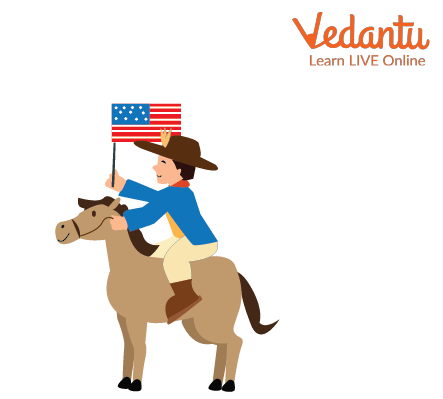Yankee Doodle: A Patriotic Song
Quite possibly, the most famous and dearest tune, particularly in the USA, the "Yankee Doodle", is an energetic rhyme first recorded in 1775. The principal known rendition of Yankee Doodle is ascribed to English specialist Richard Shackburg. The tune involves a similar song as the "Lucy Locket" rhyme.

Yankee Doodle
What Do You Mean by Yankee Doodle?
Nobody is quite sure where the word Yankee came from. Some say an English general named James Wolfe involved it first in 1758 when he was directing some New Britain officers. Others say the word comes from the Cherokee word Yankee, and that implies quitter.
The Yankee Doodle Lyrics
Kids Version
Yankee Doodle went to town
A-riding on a pony,
Stuck a feather in his cap
And called it macaroni’.
Yankee Doodle keep it up,
Yankee Doodle dandy,
Mind the music and the step,
And with the girls being handy.
Father and I went down to camp,
Along with Captain Gooding,
And there we saw the men and boys
As thick as hasty pudding.
There was Captain Washington,
Upon a slapping stallion,
Giving orders to his men-
I guess there were a million.
Importance of this Song
As soon as the 1770s, English individuals applied the term to any individual from the US. In the nineteenth hundred years, Americans in the southern US utilised the word regarding Americans from the northern US, but not to ongoing immigrants from Europe.
Tips to Parents
It's enjoyable to decipher the melody with whichever activities you like, however, a great many people will generally support the song and move in a circular direction and have fun.
Conclusion
In this article, we talked about a poem named “The Yankee Doodle Song”. It is a nursery rhyme and is usually considered a lyrical song rather than a poem. The song teaches the children more about the history of the US and helps them get a better insight into the history of their country in a fun and interesting manner.


FAQs on The Yankee Doodle Song
1. Why did Yankee Doodle call the feather in his hat Macaroni?
To be "macaroni" was to be modern, privileged, and common. In "Yankee Doodle," then, the English ridiculed what they saw as the Americans' absence of class.
2. Who are the “yankees” referred to in this poem?
Customarily, it explicitly alludes to the old stock white, English, Protestant settlers of the New Britain region. The word appears to show up recorded as a hard copy as soon as the 1680's.
3. What is the type of this song?
This is a patriotic song.
4. For what was the song written?
This song was written during the struggle for American Independence.





